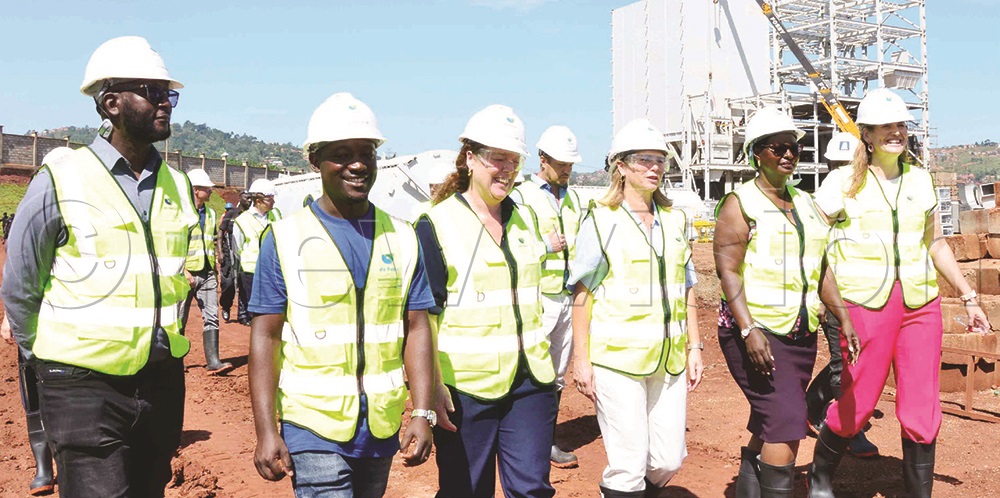By Herbert Musoke
The Government of Uganda has established a working relationship with the Netherlands to promote agriculture as a springboard for increasing household incomes and fostering economic development.
The agreement was signed by the state minister for fisheries, Hellen Adoa, on behalf of Uganda, and the Dutch minister of foreign trade and development, Reinette Klever.
Klever was accompanied by the Ambassador of the Netherlands to Uganda, Frederieke Quispel.
Klever said the agreement underscores the Netherlands’ interest in growing the Ugandan aquaculture sector.
“Through collaboration between the Republic of Uganda, the Kingdom of the Netherlands, and private sector players, we will be able to find synergies, accelerate the development of the aquaculture sector, and increase trade,” she said.
Klever added that the Netherlands continues to focus on strengthening the sector by, for example, training and supporting smallholder farmers to supply ingredients for fish feed production.
“I am proud of the work done by Dutch companies in this sector and their emphasis on growth through education and job creation, which has increased business opportunities and trade,” she remarked.

The delegation visited and toured the new fish feed factory in Jinja operated by De Heus, a Dutch company, as well as a model farm village in Njeru municipality, Buikwe district.
De Heus has invested over euro 20m (about sh79b) in this project, which is expected to open in mid-2025.
The factory is anticipated to create over 10,000 jobs and generate a market for local produce such as maize, soya bean and cassava.
Ben Tjeenk Willink, the general manager of De Heus Uganda, said the company has been in Uganda since 2018, with its imported brand of Koudijs, which is the market leader in most livestock feeds, known for its reliability, high quality, and efficiency.
“We plan to build a 50,000-tonne capacity state-of-the-art fish feed plant in Njeru, Buikwe district. This plant will serve not only Uganda but also the whole of East Africa and beyond, making it the first aqua feed plant in Africa,” he said.
Willink said the factory would produce feed for tilapia and other species by the second half of next year.
Other visits
Reinette Klever and her team also toured Dutch investments in Uganda’s agribusiness sector.
They met partners managing food security programmes supported by the government of the Netherlands and visited the Nakivale Refugee Settlement.
She said through development co-operation, the Netherlands invests euro 110m (sh434b) in Uganda annually, with programmes focusing on food security, humanitarian assistance, refugee reception, rule of law and governance, health, climate, human rights, youth as well as gender equality.
Supporting fish companies
The two ministers also launched the expansion of the Yalelo cage fish farm in Njeru, Buikwe district, which currently has 78 cages and expects to add another 35.
This represents the largest aquaculture investment in Uganda, totalling over euro 20m. Neil Hellings, the Yalelo CEO, said they farm tilapia in Lake Victoria, using large cages providing an open environment for the fish to swim freely.
“This environment produces healthier and stronger fish with the taste our customers love. Our fish enjoy the best diet formulation available, based on soy, maize and wheat,” he said.
“Because Yalelo fish receive only the highest-quality diet available, there is no mystery about what is on your plate. Using the best feed available on the African continent keeps our fish healthy and ensures a great clean taste.”
However, they face challenges regarding quality feed, as each cage of mature fish consumes a tonne daily, much of which has been imported.
This is where De Heus becomes essential in addressing the challenges faced by fish farmers like Yalelo, as feed constitutes 70-80% of total production costs.
Fisheries state minister Hellen Adoa expressed gratitude to the Kingdom of the Netherlands for investing in Uganda’s agricultural sector, which supports the growth and development of the economy.
She said the De Heus fish feed factory would help alleviate the pressure on the natural waters of Lake Victoria, where many are turning to open fish catch, leading to the depletion of the lake’s resources.
LEAD PHOTO CAPTION: Fisheries state minister Adoa (second-left), Netherlands minister Klever (second-right) and Quispel (right) after signing a working agreement recently.





